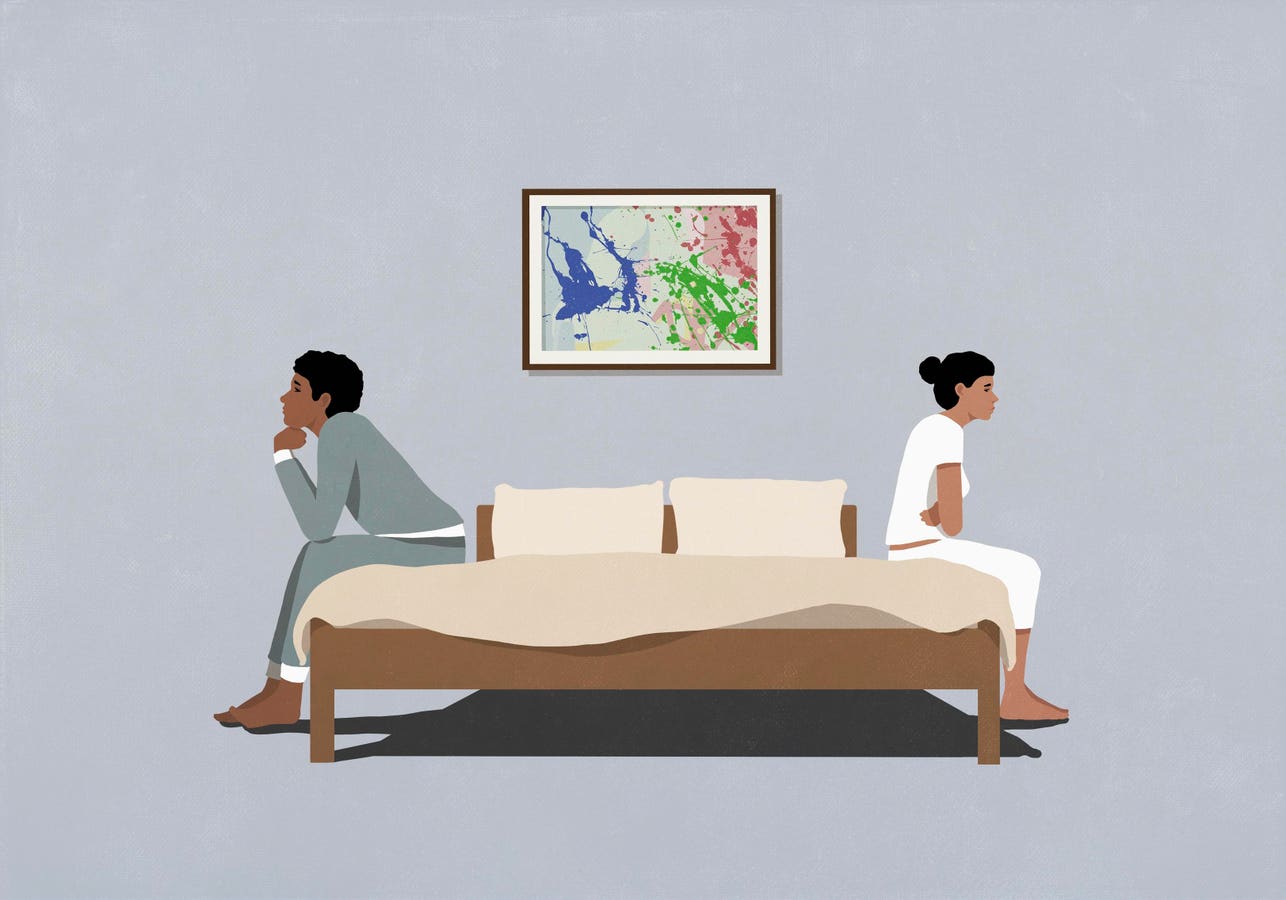Falling out of love can be incredibly painful. It’s not something either partner ever wants, yet … More
Every once in a while, you might find your partner annoying, but if you suddenly start to hyperfixate on all the differences that you once acknowledged and embraced, it may indicate underlying issues. You start to believe that they might break your relationship, something you’ve never considered before. You might even start to act differently around your partner.
If this is the case, it could be a sign that you’re falling out of love with your partner. No matter how much you try, you cannot seem to want to put in effort. What once came easily now feels exhausting. What you once viewed as their quirky traits now seem like major character flaws.
Falling out of love doesn’t always happen overnight. It’s not the same as being complacent in love or getting too comfortable with your partner. In those cases, you can still crave quality time with your partner. You still want to be with them, rather than with other people. But falling out of love is different. It’s a point when you can barely stand to be around your partner anymore.
Here are five signs that you are falling or have already fallen out of love with your significant other.
1. You Stop Treating Them With Compassion
You do not respond to their mistakes with kindness anymore. You refuse to forgive them for their missteps as easily as you did in the past. The small acts of kindness that you once did, like checking in, offering support and comforting them, begin to lessen from your end until they fade entirely.
This pattern of behavior isn’t limited to a day or two when you were tired or couldn’t communicate with your partner as much and hear them out. This is about the lack of compassion that builds over days, weeks and months until one day, you stop caring entirely. You start treating them with contempt instead. The fondness and admiration that you once had for your partner disappears.
2. You Constantly Criticize Them
Criticism is one of the “Four Horsemen of the Apocalypse,” which can signal the end of a relationship, according to marriage experts Drs. John and Julie Gottman.
Being constantly critical of your partner is not the same as making valid complaints. Your tone shifts from light teasing or constructive feedback to nitpicking all the time. You may find yourself berating their personal qualities and attributes when you’re bothered by something minor they may have done. You may even add obscenities when you talk to them, sometimes without meaning to.
There are certain social actions, called “social allergens,” which can make you feel more critical of your partner. This includes uncouth habits like bad hygiene, inconsiderate acts like being self-centered or a violation of social norms.
However, if you don’t address these behaviors with tact and respectful communication, it can damage your partner’s self-esteem. You may notice them becoming more defensive or distant in return. They may even show signs of distress because of the hurt they feel. Ultimately, your partner may start to feel unloved or emotionally unsafe.
3. You Get Overly Defensive Around Them
When you’re falling out of love, even small comments from your partner can feel like personal attacks. You might find yourself snapping back quickly, interpreting neutral feedback as criticism or getting irritated by things that never used to bother you.
This defensiveness could be a subconscious sign that you’re trying to protect yourself. You may argue more, resist compromise or reject feedback to shield your pride because the bond doesn’t feel safe or meaningful anymore.
This defensiveness can feel confusing and hurtful to your partner. They may start to feel like they’re walking on eggshells, not knowing how to communicate without triggering a negative reaction.
Over time, they start to feel unloved, misunderstood or even blamed for problems they don’t fully understand. It can make them question whether the relationship is still a safe space for vulnerability and connection.
4. You Feel Indifferent Toward Them
You’re no longer emotionally present for them when they need you. You struggle to engage with them when they talk about their day. You refuse to communicate and withdraw from conversations that they try to have.
Your indifference towards your partner may indicate that you are falling out of love with them. You shut down intentionally during conversations or arguments to “stonewall” them. You might be doing this because you feel uncomfortable discussing your feelings or because you want to reduce tension in emotionally charged situations. You may be scared to deal with your partner’s feelings altogether.
In a 2015 study, researchers Esther Liu and Michael Roloff suggested that stonewalling or silent treatment could be a response to feeling emotionally drained or burnt out from overthinking about a conflict. So, if you’re stewing over a fight or upsetting event, you’re more likely to punish your partner by ignoring them or shutting them out.
Your indifference could be due to an undue buildup of resentment. Perhaps you felt hurt, unheard, disrespected or unappreciated earlier in the course of the relationship, but instead of resolving those feelings, you covered them up.
5. You Are No Longer Excited By Them
You emotionally checked out. You don’t feel connected to them anymore. Their quirks, their passion and their presence no longer excite you. You pull away from them and don’t engage in any form of affection or physical intimacy anymore.
You might even start wondering what it would be like to date other people, if only you weren’t in a relationship. As a result of your emotional distance, your partner starts to feel anxious and distressed.
Both you and your partner get stuck in a demand-withdraw cycle, where one demands love, affection or communication and the other pulls back. But staying together only adds to your mutual unhappiness.
You might be wondering if it’s possible to fall in love with the same person all over again, and the answer is yes, you can. However, it requires true compatibility and being willing to put the work in.
Once you’re aware of how you’re feeling, open up to your partner and be prepared to deal with their feelings. Tell them that this is how you’ve felt for a while, avoid placing blame and focus on why you’re willing to do what it takes to get back together.
Your partner may struggle with your emotions, but if they love you as deeply as they did before, they might be open to reigniting the spark. However, you also have to let down your walls, be receptive and truly communicative, rather than avoidant.
In case you’re convinced that they do not make you happy anymore and that there’s no going back, it may be time to walk away. Not being honest with them also takes away from their life, just as much as it does yours. Ultimately, you have to decide whether it’s worth fighting for the relationship or make peace with letting go, once and for all.
Is your relationship still thriving or are you slowly falling out of love? Take this science-backed test to find out: Relationship Flourishing Scale








